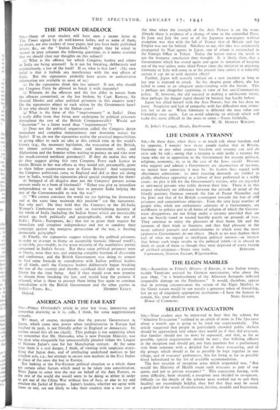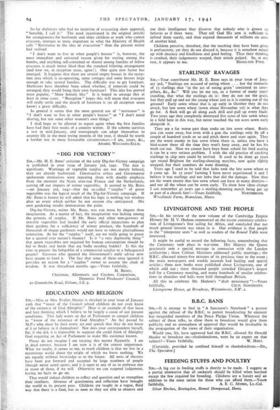SELECTIVE EVACUATION
Sul,—Your readers may be interested to hear that the scheme for " Selective Evacuation " outlined in an article of mine in The Spectator about a month ago is going to be tried out experimentally. The article suggested that people in particularly crowded public shelters should be approached, told where they would go if they did evacuate, that families should not (as now) be separated, and that, as far as possible, special requirements should be met ; that billeting officers at the reception end should get, not bare numbers but a preliminary visit from someone with a detailed list of those evacuating, and of the groups which should as far as possible be kept together in one village, and of evacuees' preferences, this list being as far as possible fitted beforehand to the list of available accommodation.
The first reaction of reception areas which responded was, "But would the Ministry of Health count such evacuees as part of our quota, and not as private evacuees? " This concession having, with some difficulty, been secured, a reception area decided to co-operate. Officials (as the details of the scheme were worked out to suit their locality) are exceedingly helpful, they feel that they may be saved a good deal of the usual dissatisfaction, friction, muddle and frustration. So far shelterers who had no intention of evacuating show approval, " Sensible, I call it." The need (mentioned in the original article) for arrangements for husbands and older children at work who cannot evacuate, emerges as more important in what the Ministry of Health calls " Resistance to the idea of evacuation " than the present writer had realised.
" I don't want to live in other people's houses " is, however, the most immediate and universal reason given for staying among the bombs, and anything self-contained or shared among families of fellow evacuees is much better liked than the standard billeting arrangement (and how we, in reception areas, agree!). One quite new factor has emerged. It happens that there are several empty houses in the recep- tion area which is co-operating, some cottages and some houses large enough to take several families. The difficulty was to get furniture. Shelterers have therefore been asked whether, if removals could be arranged, they would bring their own furniture? This idea has proved most popular, " More homely like." It is hoped to arrange this at least in some cases. " Reception " hopes this will mean that evacuees will really settle and the dearth of furniture is (as all reception areas know) a great difficulty.
In general it seems that the most general use of " resistance " is " I don't want to live in other people's houses " or " I don't mind sharing, but not some other woman's own things."
I shall hope to be allowed to report again when the first families have had their first weeks of a country winter. If the scheme survives a test in mid-January, and townspeople can adapt themselves to country life in the most trying months of the year, it should be worth a further test in more favourable circumstances.—I am, yours, &c., AMABEL WILLIAMS-EI.LIS.































 Previous page
Previous page